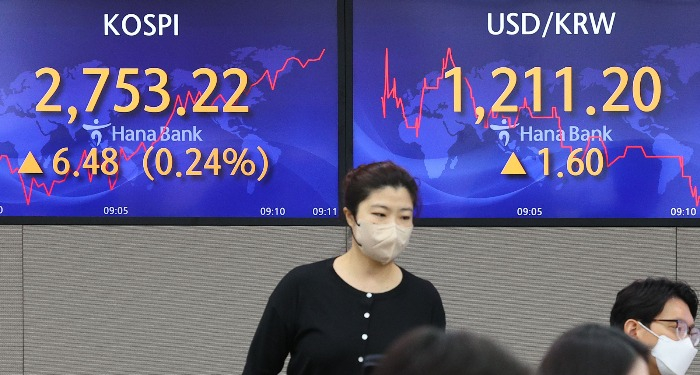
The Kospi slid by 17.80 to 2,739.85 on April 1
Foreign investors in March sold a net 4.84 trillion won ($3.97 billion) worth of shares on the Kospi, the highest monthly net sales after August 2021. Foreigners’ holding rate on the main bourse has dropped to the lowest level over the past six years as the US dollar remains strong and surging raw material prices impact South Korea’s trading balance. Stocks of durable goods, the main exports of Korea, are also bearish as some countries have declared to start treating COVID-19 like an endemic disease. Foreigners dumped semiconductor stocks the last month, such as Samsung Electronics Co. and SK Hynix Inc., and bought shares with robust performances such as LG Innotek Co., Samsung Engineering Co. and Korea Zinc Inc. instead. The foreigners’ net sales of shares last month follow the net selling of 6.3 trillion won last August. Their shareholding rate on the Kospi fell from 38.2% in 2019 to 32.4% in February, hitting the lowest after 31.9% in February 2016.The main reason for foreigners’ withdrawal is the dollar’s rally amid the US Federal Reserve’s acceleration of tapering and the Russia-Ukraine war. The currency dropped below the resistance line of 1,200 won per dollar early this year, driving foreign investors to leave the Korean stock market. “A stronger dollar makes foreigners not purchase Korean stocks due to high exchange loss. The investors have other options in the Asian stock market where the dollar rally is not as strong as in Korea,” said Myung-ji Jeong, an analyst at Samsung Securities Co.Surging raw material prices are also pressuring Korea’s trade balance. Both exports and imports of Korea hit a record-high in March, making a loss in a month. The loss will further push up the dollar/won, boosting the vicious cycle,” Tae-hong Kim, chief executive of Growth Hill Asset Management Co. in Korea.The raw material price hikes could deteriorate a number of Korean firms that import raw materials and export intermediate goods. The Kospi dropped 7.39% during the first quarter of this year while some raw material exporters in the Southeast Asian countries saw a rise in their stock markets. Malaysia’s Kuala Lumpur Composite Index (KLCI) and Indonesia Stock Exchange (IDX) respectively rose by 1.27% and 7.4% in the same period.The Korean stock market has become more bearish amid the global transformation from pandemic to endemic era. Market watchers expect the endemic will drive a surge in services and a decline in consumption of durables. However, the dollar against won nears its peak, and the global dollar rally will slow down in the second half of 2022 as the European Central Bank speeds up monetary policy normalization, said Korea Investment & Securities Co. analyst Dong-chan Yeom.Stock investors need to have a focus on performances rather than market index or sector, industry watchers say. Foreigners mainly purchased some top-performing shares in March, including 293 billion won worth of LG Innotek. The electronic part manufacturer is expected to achieve more than 1 trillion won of annual operating profit in the optics solution sector. Over the past month, the firm’s estimated sales and operating profit for this year respectively rose by 157 billion won to 16.4 trillion won and 11.4 billion won to 1.4 trillion won.Additionally, foreigners bought 202 billion won worth of Samsung Engineering shares, 179 billion won of Kakao Corp., 131 billion won of Korea Zinc and 125 billion won of Korea Aerospace Industries Ltd. last month. LG Innotek, Samsung Engineering and Kakao shares respectively jumped by 17.43%, 11.21% and 12.65% in March.By Sung-Mi Shimsmshim@hankyung.comJihyun Kim edited this article.
Most Read